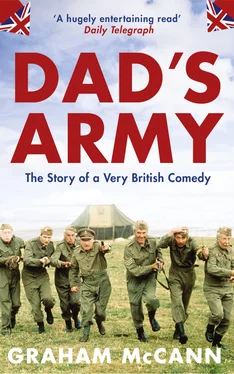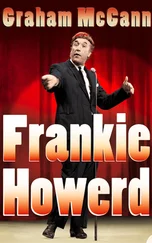Dad’s Army
The Story of a Very British Comedy
Graham McCann
Fourth Estate
A Division of HarperCollins Publishers 1 London Bridge Street London SE1 9GF
www.harpercollins.co.uk
This edition first published in 2002
First published in Great Britain in 2001
Copyright © Graham McCann 2001
The right of Graham McCann to be identified as the author of this work has been asserted by him in accordance with the Copyright, Designs and Patents Act 1988.
A catalogue record for this book is available from the British Library.
All rights reserved under International and Pan-American Copyright Conventions. By payment of the required fees, you have been granted the nonexclusive, nontransferable right to access and read the text of this e-book on-screen. No part of this text may be reproduced, transmitted, downloaded, decompiled, reverse engineered, or stored in or introduced into any information storage and retrieval system, in any form or by any means, whether electronic or mechanical, now known or hereinafter invented, without the express written permission of HarperCollins e-books.
Source ISBN: 9781841153094
Ebook Edition © OCTOBER 2012 ISBN 9780007389421
Version: 2015-12-16
HarperCollinsPublishers has made every reasonable effort to ensure that any picture content and written content in this ebook has been included or removed in accordance with the contractual and technological constraints in operation at the time of publication.
For my mother, and in memory of Dick Geary
Love and celebrationare matchless foundationsfor programme-making,given there is skill as well .
HUW WHELDON
Cover
Title Page
Copyright
Dedication
Epigraph
PROLOGUE
PART ONE: THE SITUATION
I A Peculiar Race
II A Cunning Plan
III You Will Be Watching …
PART TWO: THE COMEDY
IV The Pilot
V Series One
VI Success
PART THREE: THE CHARACTERS
VII An Officer and a Gentleman
VIII A Scot, a Spiv and a Stupid Boy
IX The Old Fools
PART FOUR: THE COMPANY
X Thetford
XI Shepperton
XII Shaftesbury Avenue
PART FIVE: THE CLASSIC
XIII The Nation’s Favourite
XIV Never Too Old?
XV Revival
EPILOGUE
Episode Guide
Bibliography
Index
Acknowledgements
Notes
About the Author
By the Same Author
About the Publisher
This is my country
These are my people
This is the world I understand
This is my country
These are my people
And I know ’em like the back of my own hand .
RANDY NEWMAN 1
Humour is not a mood but a way of looking at the world.So if it is correct to say that humour was stamped out inNazi Germany, that does not mean that people were notin good spirits, or anything of that sort, but something muchdeeper and more important.
LUDWIG WITTGENSTEIN 2
Even our jokes have walls and hedges round them .
J. B. PRIESTLEY 3
You must remember this: a small church hall, somewhere in England, sometime during the Second World War. To the left, perched high on top of a wobbly wooden stepladder, is a fresh-faced, fragile-looking youth, folded over a tommy-gun, primed and poised to pounce. To the right, seated behind a rickety card table, is a wiry, wily old campaigner, leaning over a Lewis gun, all set to snap and strike. At the centre, shiny toe to shiny toe, stand a short, stout Englishman and a tall, thin German.
The German has just announced that he has added the Englishman’s name to the ominously long list of those who, once the war has been won, will be brought to account for their actions. The Englishman has just replied that, since the Germans are never going to win this war, he can put down whichever names that he wishes. It is at this point that the fresh-faced youth on the ladder elects to interject:
Whistle while you work.
Hitler is a twerp.
He’s half barmy,
So’s his army.
Whistle while you –
‘ Your name will also go on the list!’ exclaims the German. ‘What is it?’ ‘Don’t tell him, Pike!’ orders the Englishman.
‘Don’t tell him, Pike!’ What a beautiful comic line, patently apt yet palpably absurd, so funny for being so true. It encapsulates not only the kind of qualities – brightness, decisiveness and bravery – we tend to associate with our best self, but also those – foolishness, fearfulness and frailty – that we tend to associate with our worst. It makes us laugh so much because we laugh most unaffectedly at what we know most about, and what we know most about is ourselves: each of us, at some point or other in our life, has said or done something equally as apt and equally as absurd as ‘Don’t tell him, Pike!’
It is really no wonder then that this scene has been hailed by some as the funniest moment in the history of British television, 4 nor that the show in which it featured has come to be recognised as one of this medium’s most treasurable achievements. 5 We do not warm to just any old thing that the small screen serves up to us; for all of the hours, days, months and even years of television that we watch in the course of a lifetime, we actually remember very little, and cherish even less. We tend to recall and respect only those few programmes which try neither to be momentous nor mundane, but which simply try, right here, right now, to engage our minds and our moods.
Dad’s Army was just such a programme. It ran for nine years – from the summer of 1968 to the winter of 1977, stretching out over nine series and eighty episodes – and has continued to be a frequently repeated favourite ever since. Its extraordinary appeal, in terms both of breadth and of depth, has remained remarkably solid over the years. For example, the episode entitled ‘The Deadly Attachment’ (which featured that ‘Don’t tell him, Pike!’ line) attracted an estimated audience of 12,928,000 when it was first broadcast on BBC1 back in 1973; when, the following year, it received its initial repeat, 10,908,000 people tuned in to see it, as did 9,082,800 for the second repeat in 1978 and 10,600,000 for the third in 1989. 6 Such rare and special constancy has little to do with any clinging need for nostalgia: 7 among the programme’s most devoted admirers are some of those who would prefer to forget the war, as well as some of those who are not able to recall it. Dad’s Army’s lasting appeal has a great deal to do with an unquenchable craving for quality.
Dad’s Army , as a television programme, was something special. It stood out back then, when television’s aim was to entertain a nation, and it stands out even more prominently now, when the intention is merely to indulge a niche. It was – it is – an exceptional piece of programme-making. Every element epitomised the unshakeable commitment to excellence: the gloriously apposite theme song, a flawless recreation of the sound of wartime defiance; the well-chosen setting, animated by the meticulously assembled authenticating detail; the quietly effective style of direction, focusing our attention on the action rather than the art; and, at the very heart of it all, the consistently fine acting and writing which combined to cultivate a set of characterisations that audiences came not only to laugh at but also to live with and love.
Читать дальше












